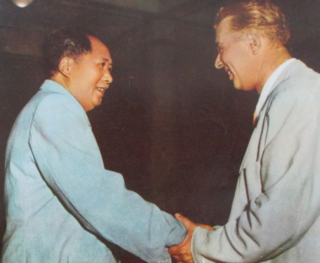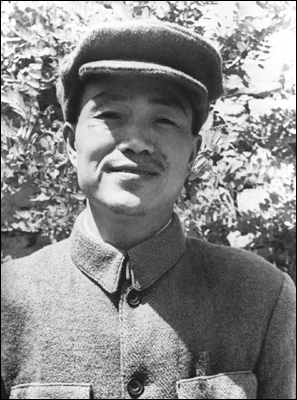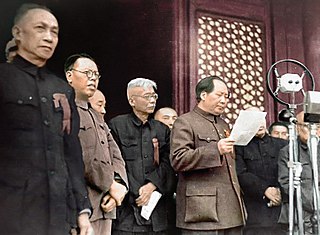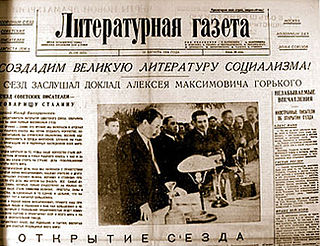Related Research Articles

Deng Xiaoping was a Chinese statesman, revolutionary, and political theorist who served as the paramount leader of the People's Republic of China from 1978 to 1989. In the aftermath of Mao Zedong's death in 1976, Deng succeeded in consolidating power to lead China through a period of Reform and Opening Up that transformed its economy into a socialist market economy. He is widely regarded as the "Architect of Modern China" for his contributions to socialism with Chinese characteristics and Deng Xiaoping Theory.

Maoism, officially Mao Zedong Thought, is a variety of Marxism–Leninism that Mao Zedong developed while trying to realize a socialist revolution in the agricultural, pre-industrial society of the Republic of China and later the People's Republic of China. A difference between Maoism and traditional Marxism–Leninism is that a united front of progressive forces in class society would lead the revolutionary vanguard in pre-industrial societies rather than communist revolutionaries alone. This theory, in which revolutionary praxis is primary and ideological orthodoxy is secondary, represents urban Marxism–Leninism adapted to pre-industrial China. Later theoreticians expanded on the idea that Mao had adapted Marxism–Leninism to Chinese conditions, arguing that he had in fact updated it fundamentally and that Maoism could be applied universally throughout the world. This ideology is often referred to as Marxism–Leninism–Maoism to distinguish it from the original ideas of Mao.

Socialist realism was the official cultural doctrine of the Soviet Union that mandated an idealized representation of life under socialism in literature and the visual arts. The doctrine was first proclaimed by the First Congress of Soviet Writers in 1934 as approved method for Soviet cultural production in all media. In the aftermath of World War II, socialist realism was adopted by the communist states that were politically aligned with the Soviet Union. The primary official objective of socialist realism was "to depict reality in its revolutionary development" although no formal guidelines concerning style or subject matter were provided.

Alexei Maximovich Peshkov, popularly known as Maxim Gorky, was a Russian and Soviet writer and proponent of socialism. He was nominated five times for the Nobel Prize in Literature. Before his success as an author, he travelled widely across the Russian Empire changing jobs frequently, experiences which would later influence his writing.

The Sino-Soviet split was the gradual worsening of relations between the People's Republic of China (PRC) and the Union of Soviet Socialist Republics (USSR) during the Cold War. This was primarily caused by doctrinal divergences that arose from their different interpretations and practical applications of Marxism–Leninism, as influenced by their respective geopolitics during the Cold War of 1947–1991. In the late 1950s and early 1960s, Sino-Soviet debates about the interpretation of orthodox Marxism became specific disputes about the Soviet Union's policies of national de-Stalinization and international peaceful coexistence with the Western Bloc, which Chinese leader Mao Zedong decried as revisionism. Against that ideological background, China took a belligerent stance towards the Western world, and publicly rejected the Soviet Union's policy of peaceful coexistence between the Western Bloc and Eastern Bloc. In addition, Beijing resented the Soviet Union's growing ties with India due to factors such as the Sino-Indian border dispute, and Moscow feared that Mao was too nonchalant about the horrors of nuclear warfare.
From November 1978 to December 1979, thousands of people put up "big character posters" on a long brick wall of Xidan Street, Xicheng District of Beijing, to protest about the political and social issues of China; the wall became known as the Democracy Wall. Under acquiescence of the Chinese government, other kinds of protest activities, such as unofficial journals, petitions, and demonstrations, were also soon spreading out in major cities of China. This movement can be seen as the beginning of the Chinese Democracy Movement. It is also known as the "Democracy Wall Movement". This short period of political liberation was known as the "Beijing Spring".

Andrei Aleksandrovich Zhdanov was a Soviet politician. He was the Soviet Union's "propagandist-in-chief" after the Second World War, and was responsible for developing the Soviet cultural policy, the Zhdanov Doctrine, which remained in effect until the death of Joseph Stalin. Zhdanov was considered Stalin's most likely successor but died before him.
The time period in China from the death of Mao Zedong in 1976 until the 1989 Tiananmen Square protests and massacre is often known as Dengist China. In September 1976, after CCP Chairman Mao Zedong's death, the People's Republic of China was left with no central authority figure, either symbolically or administratively. The Gang of Four was purged, but new Chairman Hua Guofeng insisted on continuing Maoist policies. After a bloodless power struggle, Deng Xiaoping came to the helm to reform the Chinese economy and government institutions in their entirety. Deng, however, was conservative with regard to wide-ranging political reform, and along with the combination of unforeseen problems that resulted from the economic reform policies, the country underwent another political crisis, culminating in the crackdown of massive pro-democracy protests in Tiananmen Square.

On the Ten Major Relationships is a speech by Mao Zedong which outlines how the People's Republic of China would construct socialism different from the model of development undertaken by the Soviet Union. It was delivered by Mao during an enlarged session of a Politburo meeting of the Chinese Communist Party on April 25, 1956, and further elaborated in the 7th Supreme State Conference on May 2 the same year.

The Sino-Albanian split was the gradual worsening of relations between the People's Socialist Republic of Albania and the People's Republic of China in the period 1972–1978.

The Marxist–Leninist Party of Germany is a communist political party in Germany. It was founded in 1982 by members of the Communist Workers Union of Germany and is one of the minor parties in Germany.

Deng Xiaoping Theory, also known as Dengism, is the series of political and economic ideologies first developed by Chinese leader Deng Xiaoping. The theory does not reject Marxism–Leninism or Maoism, but instead claims to be an adaptation of them to the existing socioeconomic conditions of China.
The campaign against spiritual pollution, or Anti-Spiritual Pollution Campaign, was a political campaign spearheaded by conservative factions within the Chinese Communist Party that lasted from October 1983 to December 1983. In general, its advocates wanted to curb Western-inspired liberal ideas among the Chinese populace, a by-product of nascent economic reforms and the "New Enlightenment" movement which began in 1978.

Hu Qiaomu was a Chinese sociologist, Marxist philosopher and politician.
In Maoism, a capitalist roader is a person or group who demonstrates a marked tendency to bow to pressure from bourgeois forces and subsequently attempts to pull the Chinese Communist Revolution in a capitalist direction. If allowed to do so, these forces would eventually restore the political and economic rule of capitalism; in other words, these forces would lead a society down a "capitalist road".
The Chinese Communist Party (CCP) frames its ideology as Marxism–Leninism adapted to the historical context of China, often expressing it as socialism with Chinese characteristics. Major ideological contributions of the CCP's leadership are viewed as "Thought" or "Theory," with "Thought" carrying greater weight. Influential concepts include Mao Zedong Thought, Deng Xiaoping Theory, and Xi Jinping Thought. Other important concepts include the socialist market economy, Jiang Zemin's idea of the Three Represents, and Hu Jintao's Scientific Outlook on Development.

Chinese Marxist philosophy is the philosophy of dialectical materialism that was introduced into China in the early 1900s and continues in Chinese academia to the current day.
Criticism and self-criticism is a philosophical and political concept developed within the ideology of Marxism–Leninism and Maoism. The concept would be a major component of the political philosophy of Chinese Marxist leader Mao Zedong.

Pavel Fyodorovich Yudin was a Soviet philosopher and Communist Party official specialising in the fields of culture and sociology, and later a diplomat.

The First Congress of Soviet Writers was an all-Union meeting of writers, held in Moscow from August 17 to September 1, 1934, which led to the founding of the Union of Soviet Writers.
References
Citations
- ↑ Союз писателей СССР, Воронежское отделение, «Подъëм» (1990), p. 48.
- ↑ Deng Xiaoping, "Speech greeting the 4th Congress of Chinese writers and artists", October 30, 1979. Selected Works of Deng Xiaoping, Vol. II (1975–1985). Beijing: People Publishing House, 2nd edition, October 1994.
- ↑ "China Focus: Xi stresses following path of socialist education with Chinese characteristics". Archived from the original on September 10, 2018.
Sources
- Fitzpatrick, Sheila (1984). Cultural revolution in Russia, 1928–1931 (1st ed.). Bloomington: Indiana University Press. ISBN 0253203376.
- Rothberg, Abraham (1 January 1972). The Heirs of Stalin: Dissidence and the Soviet regime, 1953-1970. Ithaca, N.Y.: Cornell University Press. ISBN 0801406676.
- Westerman, Frank (2010). Engineers of the Soul: In the Footsteps of Stalin's Writers. London: Harvill Secker. ISBN 978-1843431008.